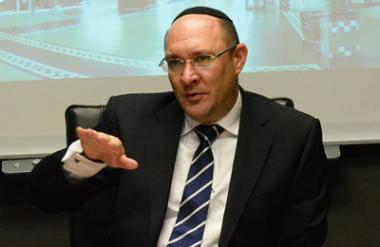Vukile's diversification strategy en route
 Vukile Property Fund CEO, Laurence Rapp said the group had grown its portfolio of high-trading shopping centres, enhancing the quality of its properties and launching its international investment strategy.
Vukile Property Fund CEO, Laurence Rapp said the group had grown its portfolio of high-trading shopping centres, enhancing the quality of its properties and launching its international investment strategy.
Retail-focused Vukile Property Fund grew its distribution payouts by 7% in the half year to September, slightly below expectations. But CEO Laurence Rapp said he was pleased at how the company’s portfolio had been refined.
“This solid set of results shows a strong operational performance and an increased retail property focus which we have been working hard to achieve,” Rapp said.
JSE-listed Vukile is an internally managed diversified but retail property focused Real Estate Investment Trust (Reit). Its total asset base is valued at R15.9bn, which includes R359m of listed securities in Fairvest and R350m in Atlantic Leaf Properties.
The investment in Atlantic Leaf, was made earlier this year in order to gain offshore exposure. A R600m investment in new retail developments has already been pre-funded. Retail property now comprises around 70% of Vukile’s overall portfolio value.
Retail had made up below 50% when Rapp became CEO four years ago.
Vukile’s strategy is to focus its South African assets in the retail space. It is also in negotiations to acquire residential properties in SA and looking offshore for other investments.
Atlantic Leaf has a primary listing on the Stock Exchange of Mauritius (SEM) and a secondary listing on the JSE’s AltX. It invests in Europe and currently owns a portfolio of exclusively UK-based industrial properties.
Many South African property funds are buying assets in western European countries such as Germany and the UK as high-quality commercial property is relatively cheaper than the equivalent assets in SA. Funding costs in Europe are also cheaper.
They are also looking at African assets, albeit in a small way. However, Rapp said given the current quality of assets in Africa and risks attached there, Vukile would only look at developed markets.
“We feel there are too many operational risks and challenges in Africa currently. We will look to developed markets only as a result,” said Rapp.
The company boosted its distributable income 27.7% over the prior half year period and grew like-for-like net property revenue by 6.1%.
During the half-year to September, it contained its vacancies at 4.7% of gross lettable area with its retail vacancies unchanged at 3.4%.
It remains conservatively geared at 27.8%, with 84% of debt hedged.
“Vukile is well hedged against a rising interest rate cycle. If interest rates rise, we have some room to raise debt,” said Rapp.
The group enhanced its empowerment credentials and its B-BBEE rating was raised to Level 3. “We are one of the most empowered property companies in SA,” said Rapp.
In terms of the group’s local plans, he said there were two mall contracts under discussion. These malls would be worth around R840m together if Vukile finalised the contracts.
Rapp reports that Vukile’s retail boosting Synergy Income Fund deal was performing well. Its assets had all been integrated into Vukile and are showing good operating metrics across the board. A strong focus on cost containment saw Vukile’s operating expense ratio decrease from 17.3% in the prior half-year to 16%, well below 2012 levels.
Vukile had also announced plans to enter the residential market and Rapp said he was making good progress in that regard. Rapp said the group expected to launch Vukile’s residential property strategy before the end of March financial year.
“We have a memorandum of understanding in place with a partner in SA’s property industry. This is currently under due diligence and is set to lead to a national relationship. We will announce further details when it becomes appropriate to do so. My target is to have 10% of Vukile’s total portfolio being residential assets,” said Rapp.
Vukile will dispose of its sovereign assets and some of its industrial assets in the next six months, as it looks to reduce its exposure to non-retail properties in SA.
Keillen Ndlovu of Stanlib, said the results were solid, even if they fell short of expectations.
"Vukile’s results came in slightly below expectations. And the distribution growth of 7% was held back by the provision of an incorrect council billing. Management have been conservative by taking the knock now rather than maybe later. Despite this, Vukile delivered a very good operational performance,” he said.













